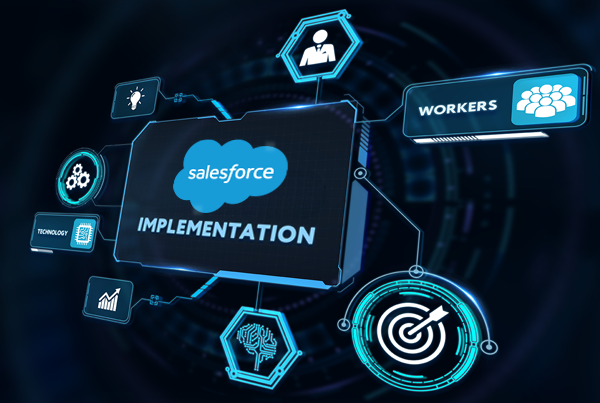Salesforce is the #1 CRM platform in the world and is used by more than 150,000 companies globally to streamline sales, marketing, customer service, and more. If you’re in the market for new CRM software and think Salesforce is a good fit, it’s important to know what all is involved in the implementation process.
Ready to take the next step with Salesforce? Book a meeting with our experts to discuss how we can streamline your implementation.
Book a MeetingImplementation Planning
Although Salesforce is user-friendly, implementing any CRM software can be a challenge. This is especially true if you require custom reports, third-party integrations, and other unique workflows.
The time needed for a Salesforce implementation, and the success of the implementation, will depend on several factors:
How much customization you require
The integrity, volume, and organization of your data to be imported
The structure of your existing software environment
Your team’s expectations about new software adoption
How well you and your chosen Salesforce partner collaborate
Selecting a Salesforce Partner
A Salesforce implementation doesn’t have to be overwhelming; with help from a dedicated implementation partner, you can enjoy a smooth transition from your existing systems to Salesforce CRM. Thousands of businesses have teamed up with Salesforce’s partner network to implement, support, and customize Salesforce’s solutions for sales, marketing, and customer service.
There are plenty of partners to choose from, but you’ll want to look for an experienced partner that can work closely with your team to reduce operational disruption, assist with data migration, develop custom workflows, and train your team on the new system.
Salesforce Implementation Steps
You’ll work closely with your chosen software partner to pull off a frictionless Salesforce CRM implementation. Here’s a breakdown of the eight-part implementation process and what you can expect:
1. Assemble Implementation Team
To define the scope of your project, you’ll need to create a team in charge of every aspect of the implementation. This will include your Salesforce implementation partner, but it will also include your own teammates. Cross-functional alignment is crucial here, so depending on which features you’re using and which edition you select, you will need to loop in folks from multiple departments:
- Executive Sponsor: A software implementation is no small project, which means it requires an executive sponsor to ensure alignment with business strategies and clear roadblocks as they arise. A CMO or VP of Sales would be a great choice for this role.
- Project Manager: A strong, organized decision-maker should take the lead on the project, acting as the main contact between your company and your implementation partner.
- Sales, Marketing, and Service Leadership: High- and mid-level managers in the areas covered by Salesforce CRM will have the best insight regarding how the software will be used and how it will impact existing workflows. These individuals should be included on the implementation team to ensure the software is launched with their job roles in mind.
- IT/Systems Lead: Any new software implementation should include a member of the IT team to handle data migration, integrations, and user access.
- Departmental Representatives: If members of other teams, such as finance or HR, will use Salesforce, you will want to include representatives in the implementation team so they can offer input before go-live.
2: Establish Goals with Dates
Once you’ve brought your team together, it’s time to collaborate with your Salesforce partner and establish clear goals and objectives for what you want to achieve. These goals are based around your current operations and what you anticipate will change once you’ve gone live with your new software. Here’s how you can determine those goals:
- Dig into your metrics
- Keep staff engaged
- Map out the tools you want to integrate
- Communicate clearly
By carefully assessing your processes and determining what you want to achieve with Salesforce, you’ll gain information to help you estimate the time and resources you’ll need to devote to your implementation.
Your goals will set the stage for the scope of your Salesforce implementation, which in turn establishes the timeline and budget. Here’s what you should decide in the scoping process:
- Users: How many people will need to access Salesforce, and what level of clearance do they need?
- System integrations: Will Salesforce handle all your needs, or do you need to keep or invest in additional solutions for areas like payroll or operations?
- Compliance and security restrictions: If you operate in a regulated industry like healthcare or construction, are your software and integrations compliant?
- Training and change management: How much training is required to get your team started on the software?
Before migrating any data between systems, your team will need to work with your Salesforce implementation partner to audit your existing data. You’ll determine the information and fields that are essential to your business and should be preserved during migration, but you’ll also identify ways to clean up your data. Typically, this involves the following:
- Removing duplicate accounts
- Purging or revising outdated information
- Removing unnecessary fields
- Standardizing data formats
This step is what takes Salesforce from being a CRM system to being your CRM system. While configuration will vary from business to business, these are the most common areas that are tailored during this step:
- Workflows
- Sales funnel milestones
- Marketing campaign templates
- Custom fields and entities
- User roles and permissions
- Integrations
Before your team goes live with Salesforce, your implementation partner will help you test-drive the software and ensure that its components will work independently and in tandem. As you orient yourself to Salesforce, here’s what you’re looking for:
- Configuration errors
- Integration issues
- User concerns
- Data validation
Once you’ve identified any lingering issues, you’ll work with your implementation partner to smooth everything out in anticipation of your official Salesforce start date.
Welcome to Salesforce (officially)! Once you deploy the software, your team will work full-time with the system. You won’t be alone, though—your implementation partner will stay by your side as you learn the ropes for activities like campaign customization, pipeline management, and ticket routing.
Even after you’ve grown accustomed to Salesforce, you’re likely to discover imperfections in your workflows and new report formats you want to build. No matter how big or small the project, your Microsoft partner is on standby to help you as your needs change. Here’s how they can help:
- Integrations: Did a software update for one of your peripheral systems break its connection to Salesforce? Or perhaps you’re investing in a new tool that you’d like to synchronize with your new CRM. Your Salesforce partner can help ensure smooth data flow between systems.
- Ongoing training: The Salesforce CRM platform is always growing, and so is your business. To make the most of the software as it changes, or to help new employees learn the ropes, you can tap your Salesforce partner for training. This can be broad training for a large group or one-on-one sessions that dive deep into features relevant to a specific job role.
- Software support: If you run into trouble with the software and can’t figure out how to proceed, your Salesforce partner can step in to review the issues and offer quick fixes as well as permanent solutions.
- Ongoing audits: Your Salesforce partner can work with you to review how the software has kept pace with changes to your business and make relevant adjustments. For instance, if you opened a new office location, your Salesforce partner can expand your data network to accommodate.
How Long Does It Take to Implement?
Depending on which modules and features your business needs, a Salesforce CRM implementation can take anywhere from 2–3 months. But the software’s depth is just one piece of the implementation puzzle.
Remember that the functionality you want and the customizations you require will impact your implementation. Are you simply implementing the sales module out of the box? Are you customizing the lead to opportunity workflow or building extra modules? Are you fully integrating the new CRM solution with your existing email and marketing automation? The more unique your implementation, the more time and labor it will require.
You and your software partner will collaborate at every stage of the process to ensure effective implementation. The benefit of collaboration is two-fold—the implementation is faster and smoother, and the software is configured more accurately to the needs of your business.
Pricing and Cost
The cost of your Salesforce software depends on several factors, including the modules you want, the users you need, and the level of customization you require. Typically, the more involved your implementation is, the higher the overall cost will be.
Our Salesforce CRM pricing guide can give you a reliable estimate for implementation and ongoing costs based on the features you want.
Unlock your own personal pricing calculator and get a price estimate for your software and implementation services.
Salesforce Pricing CalculatorReady to Implement Salesforce?
Salesforce can take anywhere from 2 to 8 weeks to implement, on average. Less time is required for companies that only need out-of-the-box functionality and nothing more. However, Salesforce is known and beloved for its seamless integrations with third-party applications and its ease of customization. You can expect the process to take a few months if you are selecting add-ons from the AppExchange, and even longer if your team requires a custom-made application built from scratch.
Thankfully, with a skilled Salesforce partner like Cargas, you’ll have all the expertise you need to make your implementation a roaring success.
First, we’ll discuss your challenges and needs and identify how Salesforce can help you achieve your business goals. Once you’ve signed our implementation agreement, we’ll schedule a kickoff meeting to plan your implementation. Our schedule will include time for customization, data migration, training, and a test-run of the software before you go live.
Our approach to software implementation and support stems from our purpose of Shared Success—when you succeed, we succeed, too. This strategy has helped us achieve a 99% success rate when implementing top ERP and CRM solutions from Acumatica, Sage, Microsoft, HubSpot, and Salesforce, and it’s why we stick with our customers for the long-term to help their businesses grow.

